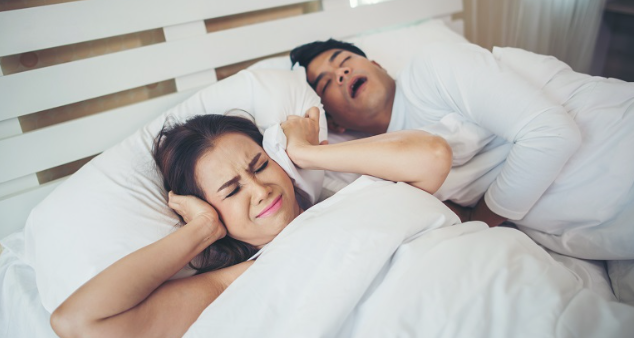
- Change Sleep Position:
- Sleeping on your back can cause your tongue and soft tissues in the throat to collapse backward, blocking the airway. Try sleeping on your side to reduce snoring.
- Elevate Your Head:
- Raising the head of your bed by a few inches can help prevent your tongue from falling back into your throat, reducing snoring. You can also use a thicker pillow.
- Maintain a Healthy Weight:
- Excess weight, especially around the neck, can contribute to snoring. Losing weight through diet and exercise can reduce the fatty tissue in the throat and alleviate snoring.
- Avoid Alcohol and Sedatives:
- Alcohol and sedatives relax the muscles of your throat, increasing the likelihood of snoring. Try to avoid consuming these at least 2-3 hours before bedtime.
- Treat Allergies:
- Allergies can cause nasal congestion, making it harder to breathe through your nose. Using antihistamines or decongestants can help clear your nasal passages and reduce snoring.
- Quit Smoking:
- Smoking irritates the airways and causes inflammation, which can lead to snoring. Quitting smoking can improve airflow and reduce snoring.
- Stay Hydrated:
- Dehydration can cause the tissues in your throat to become sticky, increasing snoring. Drink plenty of water throughout the day to keep the throat hydrated.
- Use a Humidifier:
- Dry air can irritate the nasal passages and throat, leading to snoring. Using a humidifier in your bedroom can help keep the air moist and reduce snoring.
- Practice Good Sleep Hygiene:
- Poor sleep quality and sleep deprivation can contribute to snoring. Aim for a regular sleep schedule and ensure you’re getting enough rest each night (7-9 hours for most adults).
- Try Anti-Snoring Devices:
- There are various anti-snoring devices available, such as nasal strips, mouthpieces, or mandibular advancement devices, which help improve airflow and reduce snoring.
If snoring persists despite trying these strategies, it’s advisable to consult a healthcare provider, as it could be a sign of a more serious condition like sleep apnea.